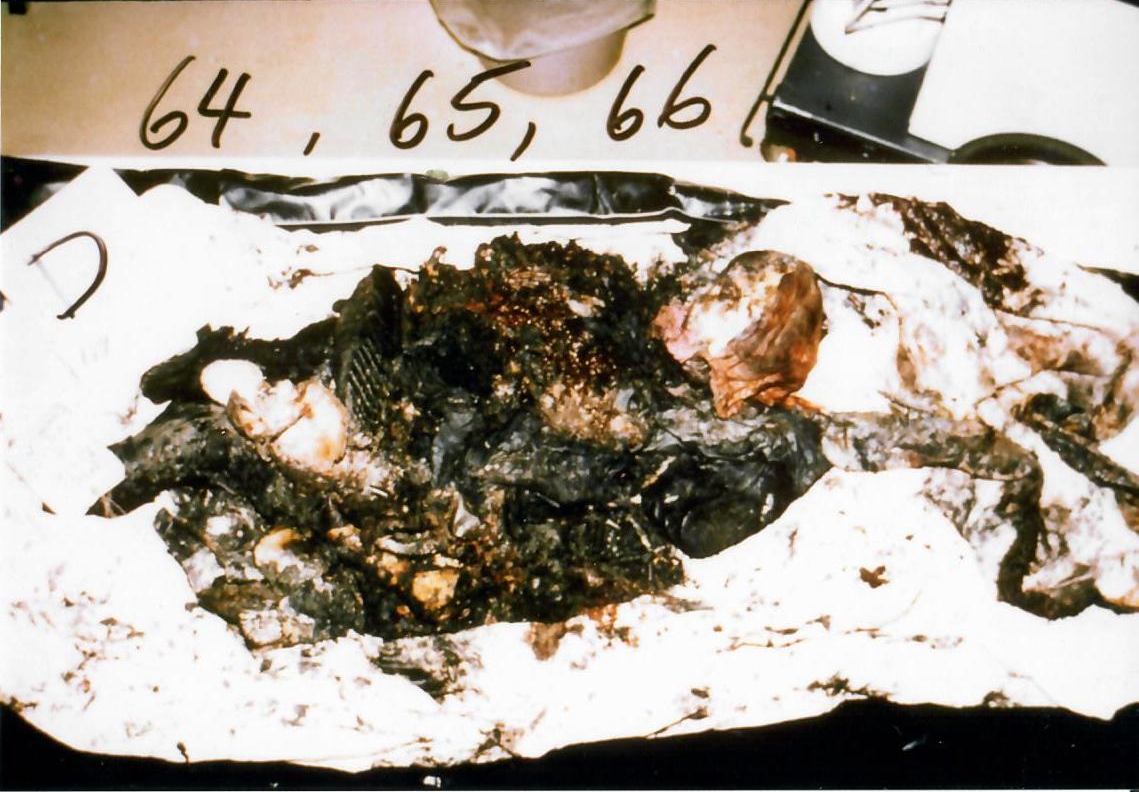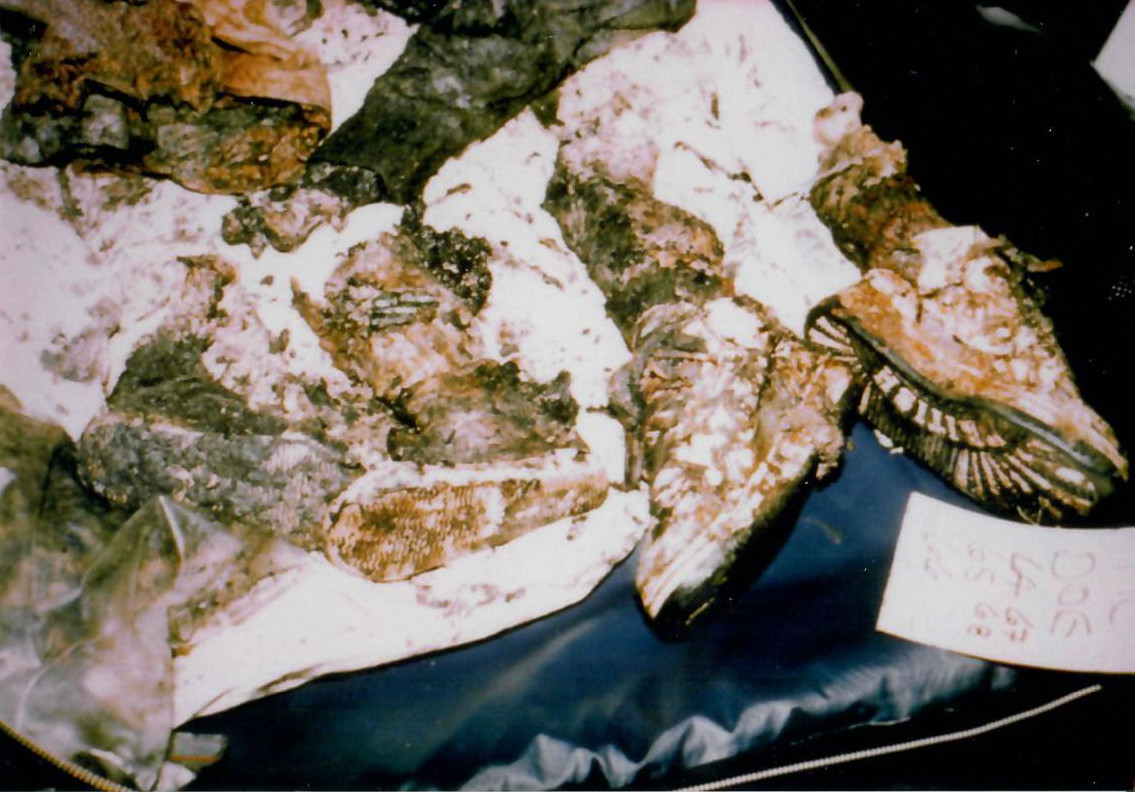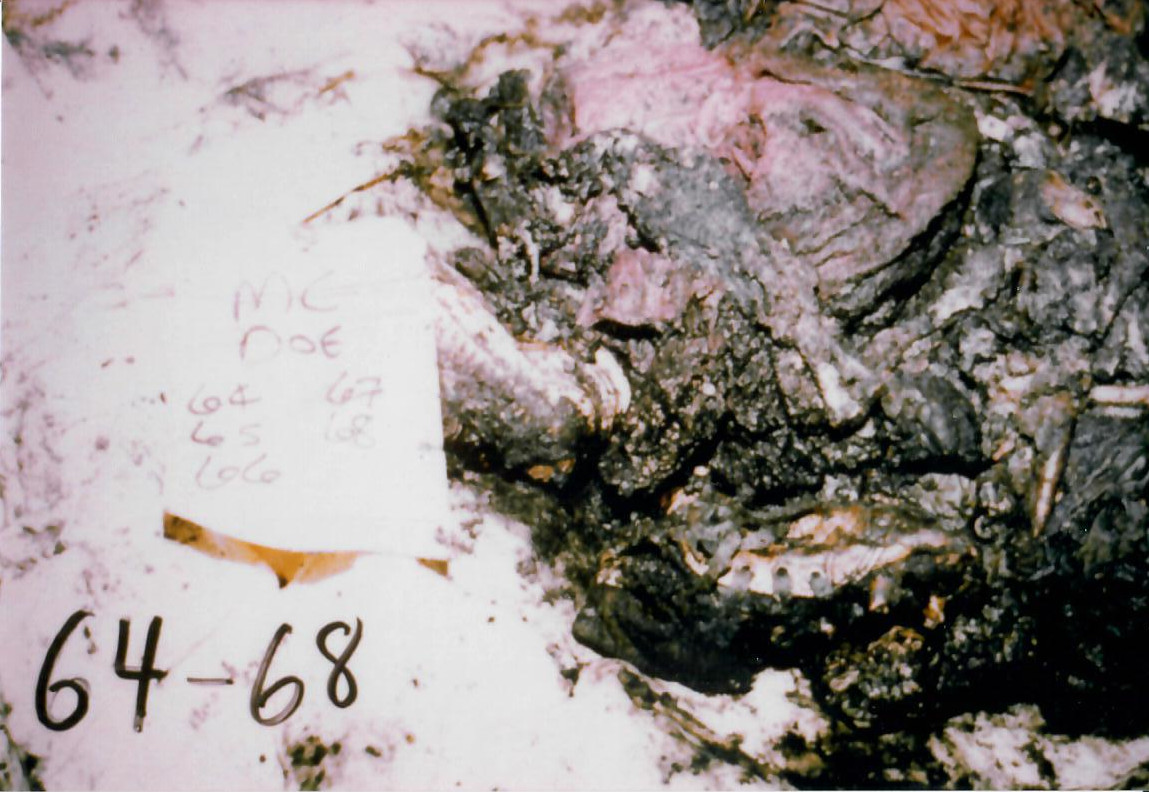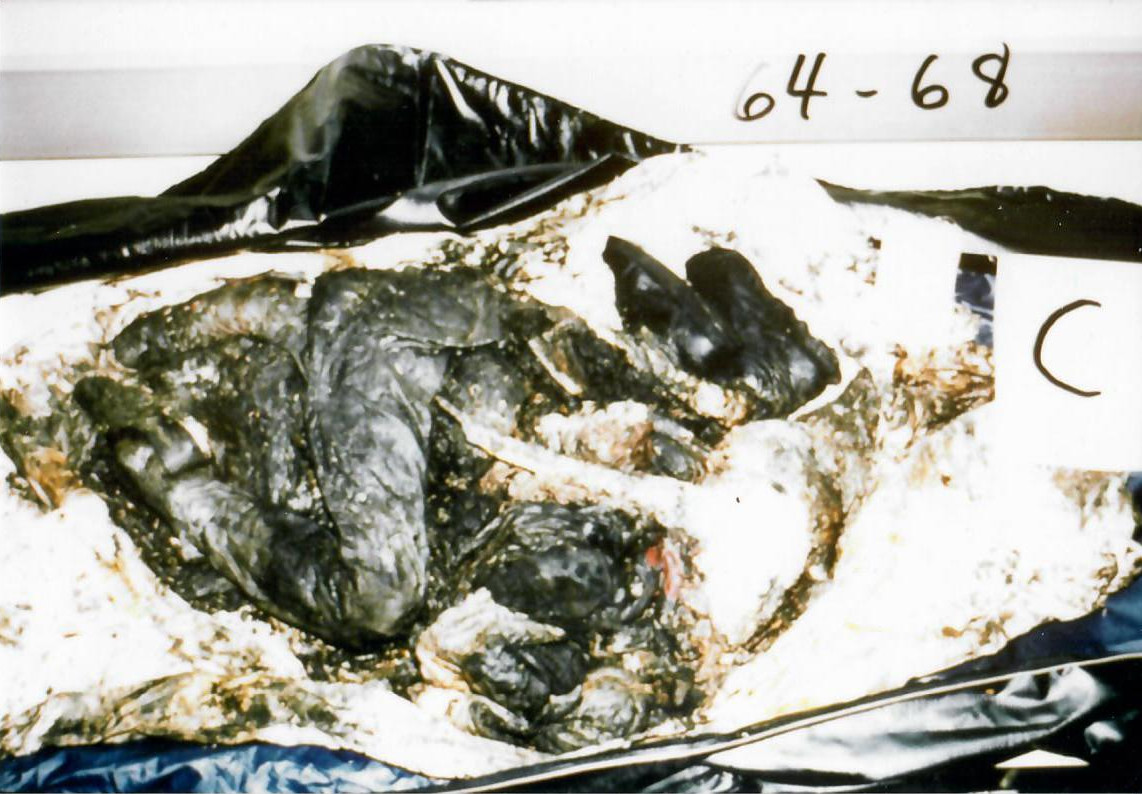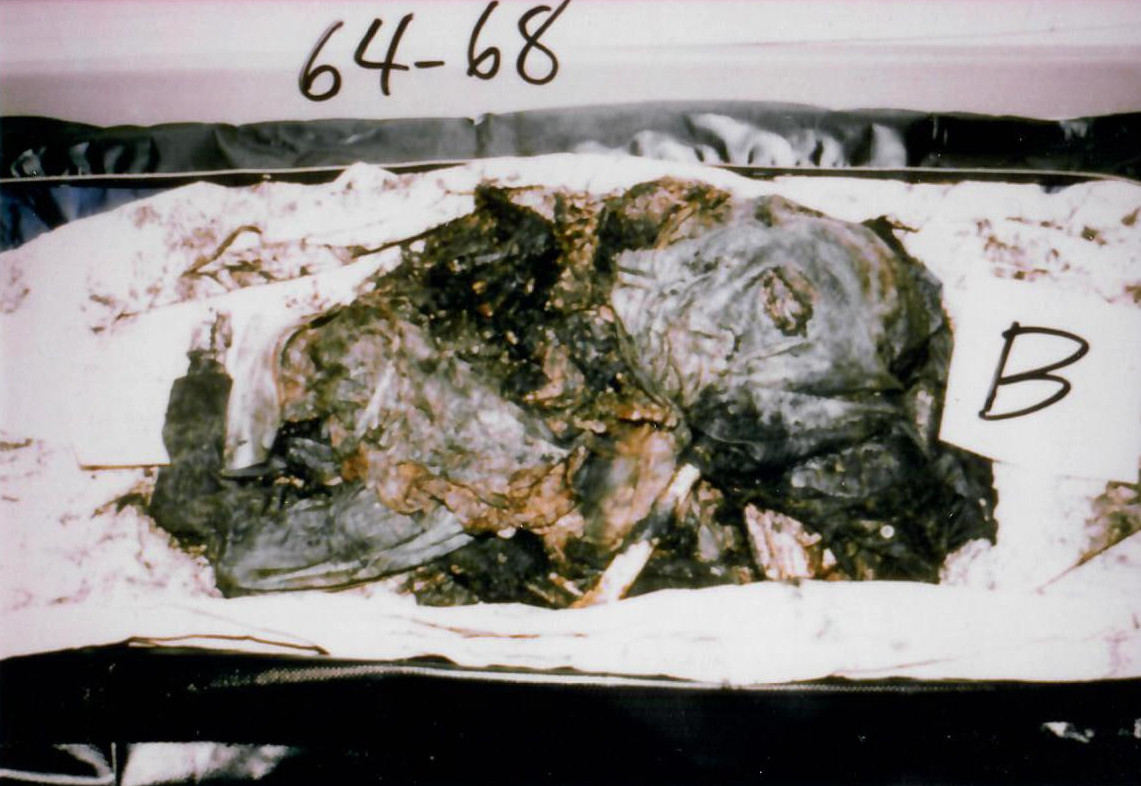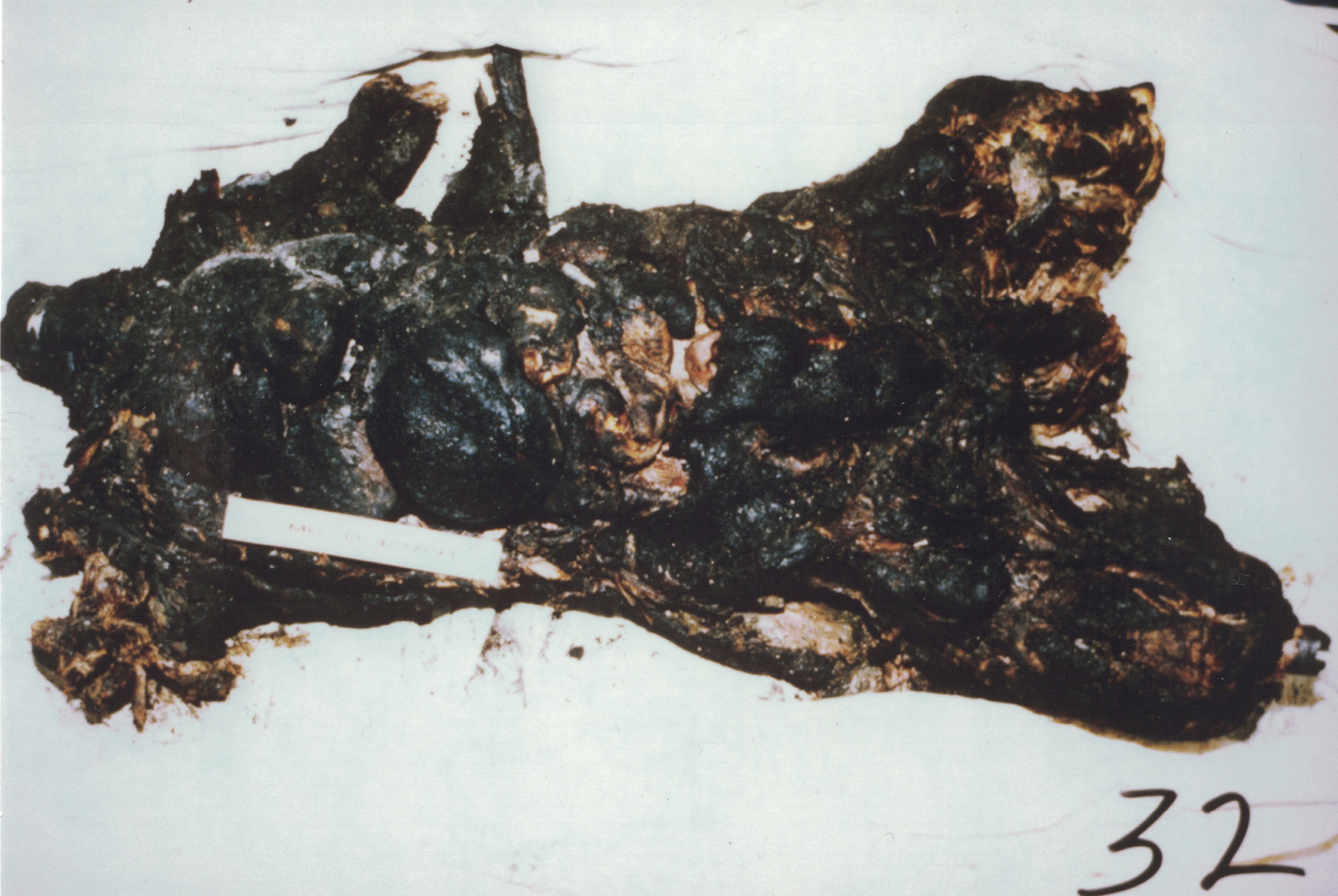 The remains of John McBean, MC Doe 32, who allegedly died of smoke inhalation. All four limbs and the head were truncated as if with a tool, and the autopsists wrote, "Head injury cannot be ruled out." Click to enlarge. |
To profane a dead body by cutting it to pieces has always seemed, at least to our Western eyes, an act of bestial brutality. It is one thing to do murder. It is quite another to destroy the murder victim's identity, and this is the effect of dismemberment. (Dr. William R. Maples, forensic anthropologist, in Dead Men Do Tell Tales, pg. 61)
In the exhibit, When Did They Die?, we saw that bodies fall apart in advanced stages of decomposition, when the connective tissue in the joints withers away. Unless moved by another force, the body parts in such a corpse retain their original relationship, although now disconnected.
Dismemberment, of course, is an entirely different process. The body is taken apart by a murderer or accomplice in the process of disposal, or in an attempt to obscure the cause of death, the time of death, the manner of death, or the identity of the victim.
Forensic anthropologist Dr. William Maples assures us:
Taking apart a fresh human body is no mean task … You will work up a sweat doing it. (Maples.)
In Smithsonian Comes To Waco, we learned that Dr. Douglas Ubelaker, curator of anthropology of the National Museum of Natural History at the Smithsonian Institution and top consultant to the FBI, and his Smithsonian colleague Dr. Douglas W. Owsley, came to Waco to assist the inept Dr. Peerwani to recover the bodies of the Branch Davidians.
In How the Pros Recover Bodies and Solve Murder Mysteries, we learned that forensic anthropologists take every measure to personally excavate the bodies and examine the surrounding environment. Dr. Ubelaker said that examining the bodies in exactly the same relationship they had to each other in the field is vital, and that once the relationship between the bodies and the environment is disturbed, it can never again be created with complete accuracy.
We read that the renowned forensic anthropologist Dr. William Maples, despite back pain, crawled down into an excavation hole to recover three corpses found in a common grave, and lay face to face beside the bodies while digging them out.
The corpses would have to be disinterred very carefully if a case were to be made against their murderers. The details of the crime would have to be reconstructed from the stratigraphic evidence of the scene. (Maples, pgs, 57-58.)
And we read that the care with which he excavated the murder victims preserved the details of how the crime had been committed.
But in Inside the Concrete Room, we learned that the Branch Davidian bodies inside the concrete room were excavated by the Texas Rangers, who then called the Medical Examiner's office to have them removed. As we will see in this section, despite the standards for experts in the field, many of the body parts were "sorted out" by Dr. Owsley in the morgue, and not in situ as they were being excavated.
Of the 33 bodies Dr. Peerwani says were recovered in the concrete room, eleven were found in an agglutinated mass. The local Justice of the Peace, a man with 40 years' experience in the funeral business, said he never saw anything like it. It's too bad the experts were not on hand when the mass was discovered. Perhaps they would have learned something about the circumstances surrounding the victims' deaths, or even the circumstances surrounding their interment together.
It is evident, therefore, that Drs. Ubelaker and Owsley did not use the expertise for which they are renowned, nor did they apply the customary standards of practice in their field to the recovery work in the concrete room. The Autopsy Reports contain none of the information from the crime scene that those experts could have gathered had they been applying the standards of their profession.
What is a reasonable person to think when evidence of the crime of the century is destroyed under the noses of world-class evidence handlers?
If the FBI believed what it told the public—that David Koresh was a maniac and a child molester, and that the Davidians murdered each other on the final day—the dismemberments and the agglutination would have been thoroughly investigated. Instead, the environment in which the bodies were recovered was altered and destroyed without the benefit of observation and analysis by experts.
Moreover, lies concerning that environment were being incorporated into the Autopsy Reports, and now appear on the Death Certificates.
The Autopsy Reports typically read as if the bodies had been found under a cabbage leaf. "The body is presented to the City Morgue in a black body bag …" is a typical opening for an Autopsy Report. And the Autopsy Reports typically describe dismembered and pulped bodies without expressing any curiosity about the conditions that could have produced the phenomena being described. Let us take a look:
Dayland Gent, Mt. Carmel Does 33 and 47 B
The Autopsy Report for Mt. Carmel Doe 33, identified as three-year-old Dayland Gent, tells us nothing about the conditions under which the remains were recovered. "The body is presented to the county morgue secured in a blue body bag …" Dayland is said to have died of a stab wound to the left chest. Yet the remains of Dayland Gent were picked up and put into different body bags on different days, at locations approximately three feet apart. What would cause the body of a stabbing victim to become dismembered?
The reader may want to track the recovery: According to the official recovery map (Remains Recovered from the Concrete Room), the first set of Dayland's remains was picked up on April 22, and given the number Mt. Carmel Doe 33. Then, according to the same map, more of Dayland Gent's remains were picked up with Mt. Carmel Doe 47: the Identification Matrix lists Mt. Carmel Doe 47 B as Dayland Gent (though there is no autopsy for 47 B).
Back to the recovery map (Remains Recovered from the Concrete Room). This map shows that Mt. Carmel Doe 47 was picked up on April 23. The same map also shows that locations 33 and 47 are approximately three feet apart.
Dr. Ubelaker did the anthropological examination. The question about the dismemberment of the boy's body is never raised in the Autopsy Report.
Mt. Carmel Doe 47 was identified as Dayland's mother, Nicole Gent Little. Her Autopsy Report says that the "body is presented to the County Morgue secured in a black body bag …" The diagram accompanying the written report shows that Nicole Gent Little's head was almost entirely missing. The text tells us:
The soft tissues of the head and face are burned away as are the majority of the bony structures of the head and face, including the calvarial vault, orbits and nasal area.
Nicole is said to have died of a gunshot wound to the missing head; conveniently, although the flesh and the bones of the head and face have been "burned away:"
Aportion of separately recovered occipital bone accompanies the body along with multiple isolated calvarial fault fragments recovered along with the brain adjacent to the head (note scene and morgue photographs). (Mt. Carmel Doe 47, pg. 3)
Extraordinary! The brain, one of the softest and most delicate of human organs, survives a fire that incinerates the head and face! We are also told:
An infant's left hand and forearm are recovered entangled in the hair. (Mt. Carmel Doe 47, pgs. 3-4).
Pg. 6 of the Report includes a rough illustration of the remains, indicating most of the head is "absent." Apparently, it was decided that the hand and forearm belonged to her son, and were sent over to the rest of Dayland Gent's remains; again, there is no curiosity expressed on this extraordinary dismemberment—death caused by "gunshot wound to head," head and face burned out, but brain found right there in the same body bag, along with skull fragments and the arm of her young son who died of a stab wound of the left chest—entangled in hair that didn't burn. The anthropology examination was conducted by "Douglas Housely [sic], Ph.D."
Bobbie Lane Howell Koresh, Mt. Carmel Does 67-5 and 69
The remains of one of David and Rachel Koresh's children, one-year-old Bobbie Lane Howell Koresh, were divided between two locations, approximately two feet apart, and given the numbers Mt. Carmel Doe 67-5 and Mt. Carmel Doe 69. The remains were collected on April 27-29.
Mt. Carmel Doe 69 was "presented to the County Morgue secured in a blue body bag …" and consisted of a nearly complete skull and jaw (the jaw had to be reconstructed), wavy medium brown hair, and a partial torso. Those remains were autopsied on 30 April by Stephen L. Puttoff and Gary L. Sisler, both deputy medical examiners. They decided that the child died of smoke and carbon monoxide inhalation, and they mention that the skull was damaged by an explosion.
What explosion? Neither the Treasury Report nor the DoJ Report mentions an "explosion" in or near the concrete room. Wouldn't you think that anomaly would interest an anthropologist? Isn't the ATF particularly interested in bombs and such?
The location of the remains of Doe 69 is in the back corner of the concrete room, on the side furthest from the doorway—far away from the two-foot hole in the roof. But the Autopsy Report reveals no curiosity about the explosion. The anthropology examination was conducted by Douglas Owsley, Ph.D.
Perhaps the "explosion" was caused by a soldier who fired projectiles into the concrete room after the fire burned out? The video segments which captured this scene are included in The Big Lie Continues, a video by Linda Thompson (cached), approximately one hour 24 minutes from the beginning.
The remains designated Mt. Carmel Doe 67-5 (which were part of the agglutinated mass, described below) were also assigned to Bobbie Lane Howell. Those remains were "presented to the County Morgue co-mingled with other bodies in the 'Bunker' with sorting performed by Dr. Owsley." Doe 67-5 consisted of a right foot, upper and lower legs, pelvis bones, and a right hand with an attached arm bone. Those remains were autopsied on May 2, 1993, by Dr. Peerwani, who found the child died of carbon monoxide inhalation, and at about the time of death, the child had been injured by shrapnel. No curiosity is expressed about how the body of a child who died of carbon monoxide inhalation was shattered. The anthropology examination was conducted by Douglas W. Owsley, Ph.D.
"Martin Child," Mt. Carmel Does 50 and 61
The Identification Matrix identifies the remains of Mt. Carmel Doe 50 and Mt. Carmel Doe 61 as "Martin Child." Doe 50 consists of an adult right arm bone (humerus), "the bone," according to the Autopsy Report, and "two bones" according to the Identification Matrix. Those remains were found approximately five feet from the rest of the remains, Mt. Carmel Doe 61.
A review of the first page of the Autopsy Report for Mt. Carmel Doe 61 reveals that at first the remains were identified by fingerprint comparison as Rosemary Morrison, aged 29 years. Yet the Identification Matrix filed with the Justice of the Peace identifies MC Doe 61 as "Martin child."
The remains called Doe 61 are "presented to the County Morgue secured in a black body bag …" The head is absent and the ribcage is charred. "The extremities are charred and partially absent and there is shearing injury and secondary burning of the left pelvis and femoral head; the distal leg is contained within clothing." (Emphasis added.) The accompanying diagram shows the left hip and thigh missing, but the calf present.
The Autopsy Report says, "Clothing items present include black Nike leather athletic shoes, purple socks, burned denim jeans …" If the corpse was clothed in the jeans when the shearing injury occurred, the jeans would have been sheared in the hip area. In that case, we would have to assume one shearing injury to the hip (which separated it from the victim in the jeans) and another shearing injury just above the calf that was found "contained within clothing." But where are the missing hip and thigh?
Had the body been dismembered in the concrete room, the persons recovering the bodies would have eventually come across that left hip and thigh. The whole body would have eventually been assembled. But according to the Autopsy Report, this did not happen.
The cause of death for "Martin Child" is listed as "suffocation due to overlay and burial in structural collapse." Even if autopsist Marc Krause had not visited the recovery site, and if he was relying on verbal representations, his autopsy findings make no sense. A shearing injury and missing hip and thigh could not be explained by a simple collapse of a one-story concrete structure, as we shall see below. And we have already seen in The Collapsed Bunker that Wasn't a Bunker Didn't Collapse that there was no "structural collapse" in the concrete room.
Coincidentally, Dr. Ubelaker, top consultant to the FBI, talks about his investigation of a shearing injury on the corpse of a woman who was killed by a gunshot wound to the head. Her back had been fractured and sheared off. "When I reassembled the fractured bones in their natural relationship and determined that the shearing had occurred while the body was still articulated, the timing of the mid-body damage moved a lot closer to the time of death," says Dr. Ubelaker (Ubelaker, pg. 239).
Dr. Ubelaker is listed as having done the anthropology examination on the "Martin Child." Yet we see none of the insights he could have provided by a site visit. The Autopsy Report does not reveal any curiosity about a shearing injury that severed the hip and thigh but left behind the calf, nor any curiosity about how a person who died of "suffocation" in a structural collapse could have suffered such an injury. And what about the detached arm and head? Where are the super-sleuths when you need them?
Injuries and Dismemberment
The non-existent "structural collapse" was not even a superficially valid explanation for the dismemberments we see. When a body is crushed by an object falling from the height of a ceiling, regardless of the weight, the body parts tend to remain together. They retain something of the original spatial relationship to each other, as can be seen in many fossils. The bodies in this concrete room, however, did not follow that pattern. We find heads, calves and feet, arms—a virtual kaleidoscope of body parts mixed together.
An explosion can dismember a body if the body is directly over the center of the explosion. Explosions cause ripping, shredding, and tearing injuries to a body. "Evulsion" occurs when a portion of a body is ripped off with a force driven in one direction. A sharp object, propelled by the force of an explosion, could cause evulsion injuries when the object shears through the body's bone and tissue. Dismemberment can occur in an airplane crash, when a thrown body collides with other objects.
But dismemberment can also be caused by other means. Describing the tools used to dismember bodies, Dr. William Maples says:
I have seen every tool imaginable used for this grisly purpose … It is a bloody, messy, dangerous business. (Maples, pg. 62.)
… In recent years, however, hacksaws have been supplanted by chain saws. Chain saws have certain advantages: the killer saves time and effort with a chain saw. But of course the disadvantage is that chain saws are incredibly loud and messy … (Maples, pg. 64.)
Dr. Maples goes on to describe the anatomical Stryker saw used in forensic labs.
It leaves few tooth marks and those it does leave tend to be straight, fine and seldom overlapping. (Maples, pg. 64.)
… you would be amazed how few dismemberers actually remove the legs at the hip. Most of them saw through at crotch level, leaving a stump of thighbone still attached to the pelvis, usually several inches long. This stump is a godsend to the investigator. It is here that we look for our saw marks. (Maples, pg. 65.)
Medical examiners handle the bodies of murder victims as a routine part of the job. Sometimes murder victims are dismembered. Tools are used to do that job. Medical examiners routinely look for the marks of those tools. Except in Waco—when they showed no interest at all.
John McBean, Mt. Carmel Doe 32
Where is John McBean? The Identification Matrix tells us that on April 14, 1994, DNA tests confirmed Mt. Carmel Doe 32 to be John McBean. Read the Autopsy Report for Mt. Carmel Doe 32 and look at the autopsy photo. "Body is presented to the County Morgue secured in a blue body bag …" This corpse was six times cursed: head and four limbs amputated, and burnt to a cinder as well. If the murderer was trying to hide the identity of this corpse, he/she/it could not have done a better job.
Dr. Peerwani, the person who performed this autopsy, tells us that amputations are "heat related." Certainly, the remaining stumps were incinerated along with the trunk. But the stumps are abrupt, and inconsistent with the graduated amputations caused by the ambient heat of fire. This was a body found inside a windowless concrete room, on top of spent cartridges.
There is no indication in the Autopsy Report that Dr. Peerwani looked for saw marks on the stumps. Cause of death? Smoke inhalation—but "Head injury cannot be ruled out." The anthropology examination was conducted by Douglas Ubelaker, Ph.D. No head, no jaws, no teeth, no fingerprints—so how was John McBean's body identified? By DNA tests done in the FBI lab.
Are you believing this?
Mary Jean Borst, Mt. Carmel Doe 45
The remains of Mary Jean Borst (Mt. Carmel Doe 45) were found outside the concrete room and the Autopsy Report is included for comparison with Mt. Carmel Doe 32 (John McBean, above). Marc Krouse, MD, who autopsied this body remarks, "… the right upper extremity is absent below the upper humerus."
The Autopsy Report does not reveal that inquiry was made concerning the shearing off of the right arm. The words of Dr. Maples are recalled concerning the Stryker saw used in forensic labs. "It leaves few tooth marks and those it does leave tend to be straight, fine and seldom overlapping." (Maples, Pg. 64.)
The anthropology examination was conducted by Douglas Ubelaker, Ph.D.
The Agglutinated Mass, aka:
| Mt. Carmel Doe 64 (Paiges Gent/Kara Brittani Little) |
Mt. Carmel Doe 65 (unidentified) |
Mt. Carmel Doe 66 (Lorraine Sylvia) |
||
| Mt. Carmel Doe 67-1 (Star Howell) |
Mt. Carmel Doe 67-2 (Cyrus Howell) |
Mt. Carmel Doe 67-3 (Rachel Howell) |
||
| Mt. Carmel Doe 67-4 (Hollywood Sylvia); |
Mt. Carmel Doe 67-5 (Bobbie Layne Howell) |
Mt. Carmel Doe 67-6 (Rachel Sylvia) |
||
| Mt. Carmel Doe 67-7
(unidentified) |
Mt. Carmel Doe 67-8
(unidentified) |
|||
| (For the
serious student, the complete list of Mt. Carmel autopsies is found here, which can be sorted by name or any other attribute.) | ||||
Now comes what must be one of the more remarkable finds in the history of forensic anthropology. The Glop from the Concrete Room. It should have been the subject of fascinated argument among the experts, spilling out into the pages of the popular press. But instead—we hear the sounds of silence.
These remains were found pressed together in an agglutinated mass inside the concrete room. They were among the last to be recovered, having been allowed to rot in the elements until picked up allegedly on April 27-29, 1993.
The eleven human beings said to be represented by this mass of flesh and bone include members of David Koresh's family: his wife Rachel, and their children Cyrus, Star, and Bobbie Lane; Lorraine Sylvia and her daughters Rachel and Hollywood; Paiges Gent, a baby; an unidentified infant, an unidentified toddler, and an unidentified child. Even more remarkably, the deceased, found compacted like this as if by a mechanical press, were said to have died variously of smoke inhalation, suffocation, and gunshot wounds. Some of the remains were mutilated by fire, some were disarticulated through decomposition, and some were dismembered. It is obvious that these people died in different environments, and their remains gathered after death, kneaded together, and pressed into a mound. How was this effect achieved?
Speaking of the commingled remains, Judge James Collier, Justice of the Peace for the district where the Mt. Carmel Center is located, told The Dallas Morning News:
They were all in a mingle with one another. I was in the funeral business for 40 years, and I never saw anything like this. This is the worst because of the sheer numbers of it. It's mind boggling. — The Dallas Morning News, May 1, 1993.
Sgt. Coffman, the Texas Ranger in charge of the crime scene at the concrete room testified at the 1994 San Antonio trial of the Branch Davidians about finding the bodies among the spent cartridges.
… there were several other bodies that were intertwined that we just couldn't separate without tearing them up. And so, they were all packaged in one body bag and given numbers by the medical examiner later on. (Transcript, pg. 935.)
The agglutinated mass was originally given the Mt. Carmel Doe Numbers 64-68; this is documented in the Autopsy Report, which states:
It should be noted that this subject emanated from commingled remains formerly designated as 64-68 and was subsequently designated MC Doe 67-1, B2 after anthropologic sorting/evaluation. (Mt. Carmel Doe 67-1, pg. 3)
Autopsies on this agglutinated mass were done over the course of eleven calendar days.
Sgt. Coffman said all the bodies in the agglutinated mass were put into one body bag (Transcript, pg. 935) and the Autopsy Report for Mt. Carmel Doe 66 also confirms Coffman's statement. But some of the remains in the agglutinated mass arrived at the morgue in a black body bag (Rachel Koresh's and Hollywood Sylvia's) while the others arrived in a blue body bag. Something is wrong here.
When were the remains of Rachel Koresh and Hollywood Sylvia separated from the agglutinated mass, and by whom?
Enough explanation. Let's review the Autopsy Reports:
Paiges Gent, a baby girl:
Body is presented to County Morgue co-mingled with other bodies in the "Bunker" with sorting performed by Dr. Owsley. The separated body parts are presented for autopsy wrapped in a white sheet. (Mt. Carmel Doe 64, pg. 3)
The body parts have become disarticulated due to advanced decomposition—but, the body seems to have been pulped and then kneaded together. Dr. Peerwani performed the autopsy. His observations include:
Focal areas of charring are however noted. … separated skull with disarticulated mandible. The skull is incomplete with missing occipital and left temporal bones. … Separated and decomposing fragments of scalp are also present with long blond hair. … large mass of soft tissue and viscera with co-mingled ribs, vertebrae, scapulae, sternum and most of the bones of the extremities. … External genitalia are not distinguishable because of advanced state of decomposition. (Mt. Carmel Doe 64, pg. 4)
Cause of death? Carbon monoxide inhalation, and no questions asked. Anthropology examination conducted by Douglas W. Owsley, Ph.D. Date of Autopsy: May 1, 1993
Unidentified infant:
Body is presented to the County Morgue secured in a blue body bag accompanied by a large quantity of ordinance …" (Mt. Carmel Doe 65, pg. 3)
The body is a fragmented infant's skull, absent of soft tissues of the face; some of the spinal column, a hand, and a hip.
The internal organs consist of amorphous brownish decomposing mass of tissue with active insect larvae and precludes further examination. (Mt. Carmel Doe 65, pg. 3)
Why was further examination precluded? Examining decomposing tissue and maggots is surely routine in morgues. Gary Sisler performed the autopsy; cause of death is carbon monoxide inhalation and thermal burns. Some slight charring is mentioned. Anthropology examination by Drs. Ubelaker and Owsley. Date of Autopsy is, per page 1: "fifth day of April 1993;" per page 3: "May 05, 1993.")
Lorraine Sylvia:
The body is presented to the County Morgue secured in a blue body bag … It should be noted that this body originally emanated from commingled remains formerly annotated as MC64-68C. (Mt. Carmel Doe 66, pg. 3)
Body is extensively charred with massive destruction of many bony tissues; but Mickey and Minnie characters are seen on a diaper which is still in the pocket of a jacket worn by the victim. Stephen Putthoff and Gary Sisler performed the autopsy. The body is fractured, shattered, severely decomposed and crawling with maggots. No visceral organs are present, or at least recognizable.
Cause of death is "multiple gunshot wounds of left back and thorax," and page 5 describes six bullet wounds to the back. Anthropological examination conducted by Drs. Owsley and Ubelaker. Lots of clues, possibly, but no curiosity. Date of Autopsy: May 2, 1993
Star Howell, six-year-old daughter of David and Rachel Koresh:
The body is presented to the county morgue secured in a blue body bag … It should be noted that this subject emanated from commingled remains formerly designated as 64-68 and was subsequently designated MC Doe 67-1, B2 after anthropologic sorting/evaluation. (Mt. Carmel Doe 67-1, pg. 3)
This body is partially burned, and consists of part of the skull, a torso, a pelvis, lower limbs, and an assortment of other bones and bone fragments. Decomposition is so advanced that internal organs cannot be identified, with the exception of some liver tissue.
No mention of the date of death, as usual. Stephen Puttoff performed the autopsy, and the cause of death is listed as smoke and carbon monoxide inhalation. Anthropology examination conducted by Douglas Owsley, Ph.D. Date of Autopsy: May 3, 1993
Cyrus Howell, eight-year-old son of David and Rachel Koresh.
The body is presented to the City Morgue secured in a blue body bag. The body is that of a charred torso 27" long. Remains consist of a pelvis, lumbar vertebrae, femora, tibiae and both feet. A detached right ulna and radius measure 6-1/2" respectively. The right disarticulated humerus measures 5-1/2". The right femur measures 10" in length with the right fibula measuring 9". The left femur, tibia and fibula together measure 19" in length. A muscle of the lower extremities depicts extensive cooking with decomposition. … The genitalia is extensively cooked with decomposition precluding sex determination. … The chest and abdominal organs as well as the skull are absent. (Mt. Carmel Doe 67-2, pg. 3)
Gary Sisler performed the autopsy and assigned the cause of death as follows:
Probably suffocation due to overlie and burial in structural collapse (cannot rule out trauma to the head). (Mt. Carmel Doe 67-2, pg. 2)
Even if Gary Sisler believed that there had been a structural collapse, the missing head should have been a clue signaling him that something was wrong. The concrete debris would have crushed the head, but held it in place under the weight. Nor should fire have been able to penetrate the concrete debris.
Anthropology examination by Douglas Owsley, Ph.D. Date of Autopsy: May 5, 1993
Rachel Howell Koresh, David Koresh's wife.
The body is presented to the county morgue in a black body bag … intermingled with additional remains (note anthropology reports). (Mt. Carmel Doe 67-3, pg. 3)
Marc Krouse performed the autopsy, and he notes on page 1: "body recovered from collapsed structure," and gives the cause of her death: "Suffocation due to overlay and burial in structural collapse."
Echoing Krouse, the Department of Justice reported of Rachel Koresh:
Rachel Koresh was buried alive inside the bunker. She died of suffocation. (Department of Justice report, pg. 314)
Yet most of her head is burned away. If she was buried by debris from the (non-existent) structural collapse, how did her head burn away? Fire cannot burn concrete. No questions asked. Anthropology examination by Douglas Ubelaker, Ph.D. The date of autopsy for Rachel Koresh's body is May 11, 1993.
Hollywood Sylvia, one-year-old baby daughter of Lorraine Sylvia.
Body is presented to the County Morgue co-mingled with other bodies in the 'Bunker' with sorting performed by Dr. Owsley. The separated body parts are presented for autopsy wrapped in a white sheet in a black body bag. (Mt. Carmel Doe 67-4, pg. 3)
The body is fragmented, charred, and so severely decomposed that the external genitalia are not distinguishable. Dr. Peerwani performed this autopsy; cause of death, carbon monoxide inhalation. Date of Autopsy: May 2, 1993
Bobbie Lane Howell (Mt. Carmel Doe 67-5 and Mt. Carmel Doe 69). These remains have already been discussed above. Dates of Autopsies: April 30 and May 2, 1993.
Rachel Sylvia, twelve-year-old daughter of Lorraine Sylvia.
The body is presented to the County Morgue secured in a black body bag … (Mt. Carmel Doe 67-6)
The upper torso is missing but there are isolated fragments of bones from the arms and ribs. Left forearm and hand are present. Dismemberment said to be caused by fire damage. Marc Krause performed the autopsy and assigned the cause of death to "suffocation due to overlay and burial in structural collapse." As above: If Dr. Krouse believed the concrete structure collapsed on Rachel and suffocated her, how did he think the body was incinerated? Fire cannot burn through concrete. No questions asked. Dr. Ubelaker did the anthropology examination. Date of Autopsy: May 11, 1993
Unidentified, two-and-a-half-year-old child:
"The body is presented to the county morgue secured in a black body bag …" (Mt. Carmel Doe 67-7)
Remains consist of pelvis, legs, and feet. Sex is impossible to determine due to advanced decomposition. Autopsy by Marc Krouse who left the cause of death "undetermined." Anthropology examination conducted by Douglas Ubelaker. Date of Autopsy: May 11, 1993
Unidentified infant Mt. Carmel Doe 67-8: There is no statement of how these remains found their way to the morgue.
The remains consist of fragmented skull bones, left side. Teeth in jawbone reveal age to be about 13 months. Autopsy was performed by Marc Krouse, who assigned the cause of death to "gunshot wound." No indication of an anthropology examination. Date of Autopsy: May 11, 1993.
Mt. Carmel 68: The Identification Matrix reveals that there was no body for 68. How could that happen? What were the objects numbered by the Medical Examiner?
Other Anomalies
The visitor will find many other examples of dismembered or shattered bodies in the concrete room. You may wish to look at the following (Autopsy Reports may be accessed through the Identification Matrix):
Mt. Carmel Does 31 and 31A are duplicate designations for the same remains.
Mt. Carmel Doe 31B. Mt. Carmel Doe 31B was initially designated Mt. Carmel Doe 58, which was found buried beneath the surface and recovered on April 27-29. It was identified as the unborn fetus of Aisha Summers (Mt. Carmel Doe 31A), who was found near the surface on April 22. How did the mother and the fetus become so separated? Mother found near the surface, fetus buried beneath the surface — and five days apart in recovery. Mt. Carmel Doe 58 was eventually designated "Mt. Carmel Doe 31B."
Mt. Carmel Does 31DE and 31F. Mt. Carmel Does 31DE and 31F have never been identified.
Mt. Carmel Doe 31F is a "Negroid hair braided into small loose dreadlock style, 1" to 2" long with attached scalp; focal charring," which received a dental examination and an FBI fingerprint examination. Note the reference to 31C; no autopsy report was furnished for 31C, nor does such a number appear on the Identification Matrix.
Mt. Carmel Doe 51A. Unidentified. Skull only, almost completely defleshed in less than ten days, buried in debris from concrete room in cool spring weather.
Mt. Carmel Doe 53. Isaiah (?) Martinez. The body is female, but identified as "Isaiah." Body in pieces and markedly decomposed. Missing bones suggest disintegration of the body was not due to decomposition (bones would be present) but to dismemberment.
Mt. Carmel Doe 60. Unidentified infant. Remains consist of a jaw and arm.
Mt. Carmel Doe 62. Identified as Chanel Andrade, baby daughter of Katherine Andrade, Doe 30. The baby is reported to have died of suffocation (there is no mention of structural collapse in this report). What caused the bones of her disarticulated body to become "admixed?" And why wasn't Chanel found close to her mother Katherine on the surface if the mother took the baby to the concrete room for protection from the C/S gas?
Mt. Carmel Doe 63. Identified as "Jones Twin." Body shattered.
Mt. Carmel Doe 70. Identified as Mayannah Schneider. Buried in nonexistent structural collapse. Head, shoulder, and arm were missing.
Mt. Carmel Doe 71. Identified as Michelle Jones. Torso, detached skull, separated brown hair, and assorted other parts present.
Mt. Carmel Doe 74. Identified as Melissa Morrison, aged 8. Lower legs and feet are all that remained of Melissa.
